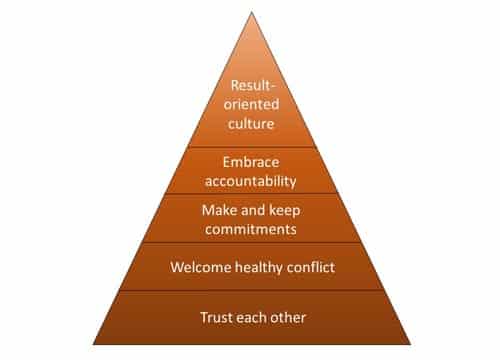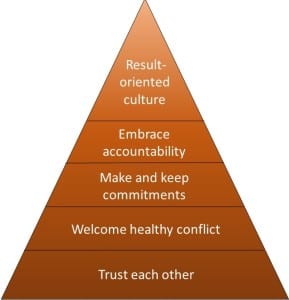A Results-Oriented Culture is the “Holy Grail” of Corporate Team Building

Share this:
I was in a client’s office not too long and saw a version of this team building success pyramid hanging on the wall. They are a professional services company and they have to collaborate, ideate and work together as a team to make client engagements successful.
 Five Steps to Successful Corporate Team Building
Five Steps to Successful Corporate Team Building
It makes perfect sense to me, but how many of us have worked in organizations where there has been a true results-oriented culture and commitment by employees and managers. I’ve worked in one or two, but they have been the exception. I’ve also worked in one organization where it was results-oriented, but fear-driven. In other words, the boss got results, but through pressure and fear. That worked for a little while but didn’t last long. The “A” players wandered off because they didn’t like the environment.
Let’s take a quick look at the steps in the team building success pyramid:
- Trust each other. No doubt this is true on a personal level. You have to believe your co-workers are honest and well-intentioned. But you also have to trust them to be competent, to perform their role, so that you can perform yours and the team can be successful. Two things build trust (or cause lack of trust).
- Familiarity–the more familiar your teammates are with each other, and the more they understand each other’s perspective and viewpoints, the more they will trust each other.
- Experience—a wise person once said, “You really can’t trust somebody until you trust them.” You can talk about trust all you want. Actions speak louder than the words.
- Embrace healthy conflict. This is a difficult one for some people to accept, because many people are conflict avoiders. But healthy conflict focused around a difference of opinions on business issues is healthy—and builds strong teams. Personal conflict is not. If you look at some of the most successful organizations, like Apple, Google and other technology companies, there are lots of passionate arguments and disagreements. There has to be. Business cycles are compressed and these guys have to make decisions quickly. In contrast, look at a big bloated enterprise where things move slowly and nobody is fighting for their point of view. Why? They don’t care. They are just going through the motions.
- Make and keep commitments. This is the other side of the coin from trust. It is delivering upon what you say you will do. It’s the way you earn trust.
- Embrace accountability. Results oriented companies have a culture of no excuses, no blame. Individuals take responsibility for their actions and the best ones have a self-directed sense of urgency.
- Develop a culture of results. Enough said. With the foundational elements of the pyramid in place, and leadership clearly articulating goals, properly allocating resources and providing feedback, results are much more easily achieved.

